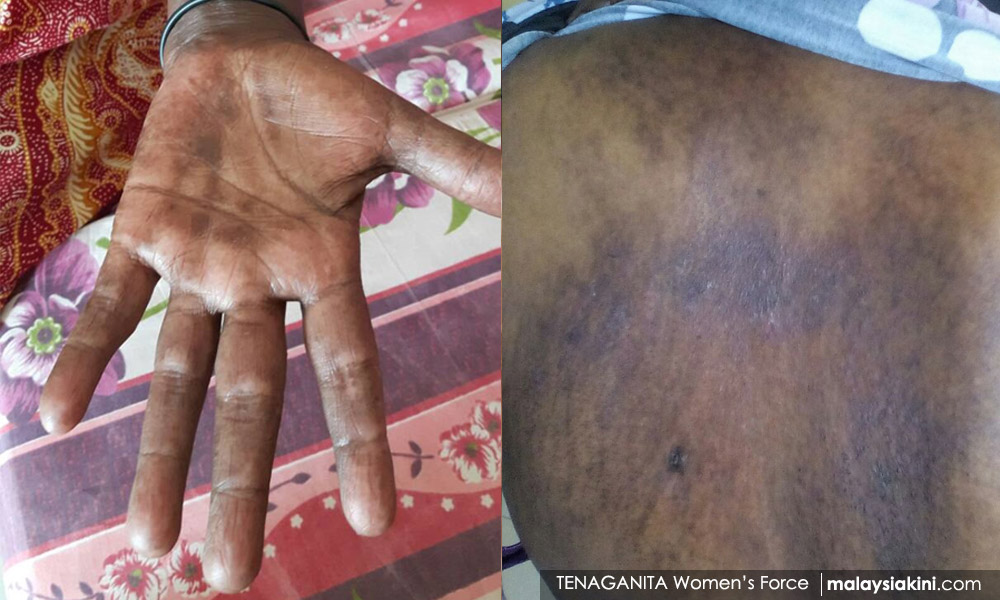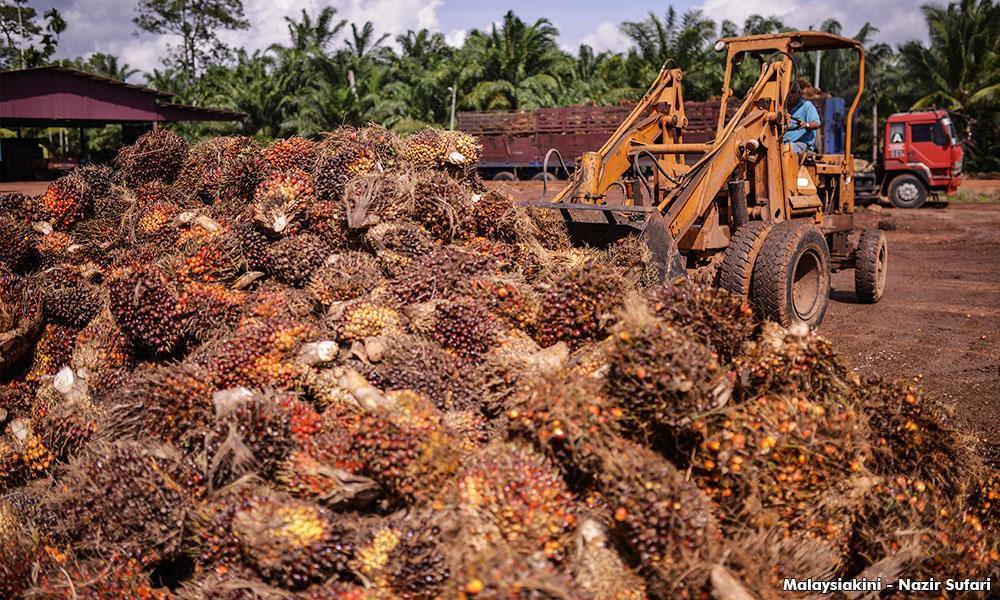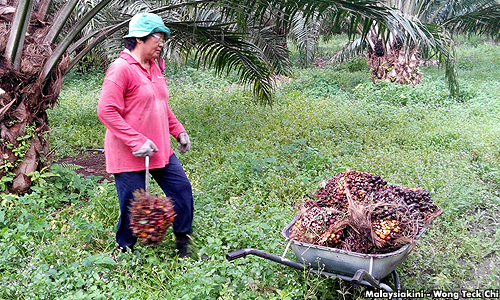COMMENT | Tenaganita calls on the government, labour unions and the palm oil plantation industries to respect women workers’ rights and dignity.
This is a painful truth solely motivated by profit and greed - the long and arduous journey of a woman worker in a palm oil plantation in Malaysia.
Many of the difficulties faced by women workers on the plantation are perhaps best articulated by Kamachy (not her real name), a worker on a plantation with RSPO (Roundtable On Sustaining Palm Oil) certification in the Klang Valley.
Here is Kamachy's story, in her own words:
"My skin has become very dark and it is unbearably itchy if I go out in the sun (photo). The doctors say that my condition has nothing to do with the pesticides.
"I know my body, and I know it is the result of working more than 15 years as a pesticide sprayer. But nobody will believe me because I am not a doctor.

"My first job was as assistant harvester at the age of 19, which meant that I helped my husband who harvested oil palm fruit bunches. My job was to collect the loose fruits from the ground and to help carry oil palm fruit bunches to the roadside. The bunches are quite heavy, about 20kg or more, but that is my job.
"After my husband fell ill in 2005, I changed jobs and became a field worker. I became a sprayer. I would drive a tractor and at the same time spray the fields. The job took me deep into the plantation. I felt very uncomfortable and unsafe when I was alone so far away from the other workers.
"If I don’t go to work because I am sick and I have a medical leave, my salary won’t be deducted. Because of my skin condition, I have to go to the hospital in the town once every two months, to give them my blood sample. It takes the whole day to go to the hospital and come back, so one day’s wages is deducted from my salary.
"I take home between RM600 to RM700 per month after all the deductions.
"I have to pay between RM 100 -150 per month for electricity. I don’t know why the company deducts so much for electricity. I have never seen the electricity bill.
"There is also a deduction of about RM30 per month for water. But there is running water in the tap only for about one hour in the morning and in the evening. At other times we have to rely on water from the tank, but the tank seldom gets filled up.
"I will retire when I am 60 years old, in five years' time. When I retire, the company will give me a gratuity of RM5000 for 40 years’ service. I don’t know how long the money will last, because I won’t have a house."
The work of Tenaganita with palm oil plantation workers shows that Kamachy’s situation reflects many of the challenges faced by women workers in the palm oil plantation today.
For that reason, on Labour Day 2018, Tenaganita would like to draw attention to a much neglected and overlooked sector of the Malaysian labour force, namely women workers in palm oil plantations.

It is interesting to recall that women were recruited to work in plantations only after 1928. when the Indian Emigration Act was amended to allow women to be recruited to work on plantations in order to balance the male-female sex ratio in order to ensure a steady stream of workers for the plantations.
With the passage of time, migrant workers from the region accounting for approximately 85 percent of the plantation labour force, have all but replaced local workers. Thus while the situation of migrant workers is coming under increasing public scrutiny, women workers who have remained on the plantations have been almost completely neglected.
As we are very much aware, palm oil is used to keep our ice cream smooth, our chocolate shiny, and our margarine free of trans fats.
Palm oil also makes its way into many processed foods, from instant noodles to cookies, and making toiletries like shampoo, toothpaste, and soap. It’s also a component of lipstick and biodiesel. They all come from the lush and blossoming plantations of Indonesia and Malaysia.
The big companies that produce the oil for food giants usually promise that it’s harvested in a way that protects both the environment and the workers, yet plantation women workers are suffering and in much distress.
Most plantation women workers are involved in “nurturing” jobs such as taking care of oil palm nurseries, weeding, applying fertilisers, spraying pesticides, and general maintenance work. With a daily wage of less than RM40, many of them are not able to earn the minimum wage of RM1000.

Apart from the struggle and great effort to earn a decent living wage in common with most other workers, women workers in plantations face other challenges which are more specific to their situation. Many women workers in the plantations are exposed to highly toxic chemicals when applying herbicides, pesticides and fertilisers.
Plantation companies claim that the workers are provided with personal protective equipment (PPE) which should protect them from the worst effects of poisoning.
The reality, however, is that the PPE that is provided is often unsuitable for the hot and humid Malaysian climate; the end result is that many women are still suffering from the worst consequences of exposure to chemicals.
The ergonomics of women’s work on plantations is one area that has been largely ignored. Much of the work involves lifting and carrying of heavy loads (eg chemicals, fertilisers) and repetitive bending and squatting which take a heavy toll on the human body.
Complaints of body aches and prolapsed wombs are frequent, but almost always dismissed as malingering, without giving due regard for their association with the workplace.
Some plantation companies, usually in line with RSPO principles and criteria, have initiated the setting up of gender committees where women workers can raise issues such as discrimination and sexual harassment. In practice however, these committees are non-functioning or ineffective.
It is also not uncommon to hear about excessive deductions for water and electricity which is provided by the company. In spite of the difficulties encountered, many women continue to work on plantations because it provides a house for their families.
In Malaysia, women plantation workers appear to have been neglected in the government’s plans to eradicate poverty and enhance the status of women. The progress achieved so far in empowering women has been unequal. Women plantation workers still lag behind, since they are unable to free themselves from the vicious cycle of poverty they find themselves in.
Hence , on Labour Day 2018, Tenaganita calls on the government, labour unions and the plantation industries to respect women workers’ rights and dignity by taking serious measures/actions to uplift the overall status, including the economic status, of women workers in palm oil plantations who continue to work tirelessly to make profits possible.
GLORENE A DAS is executive director of Tenaganita Women’s Force.
The views expressed here are those of the author/contributor and do not necessarily represent the views of Malaysiakini.

